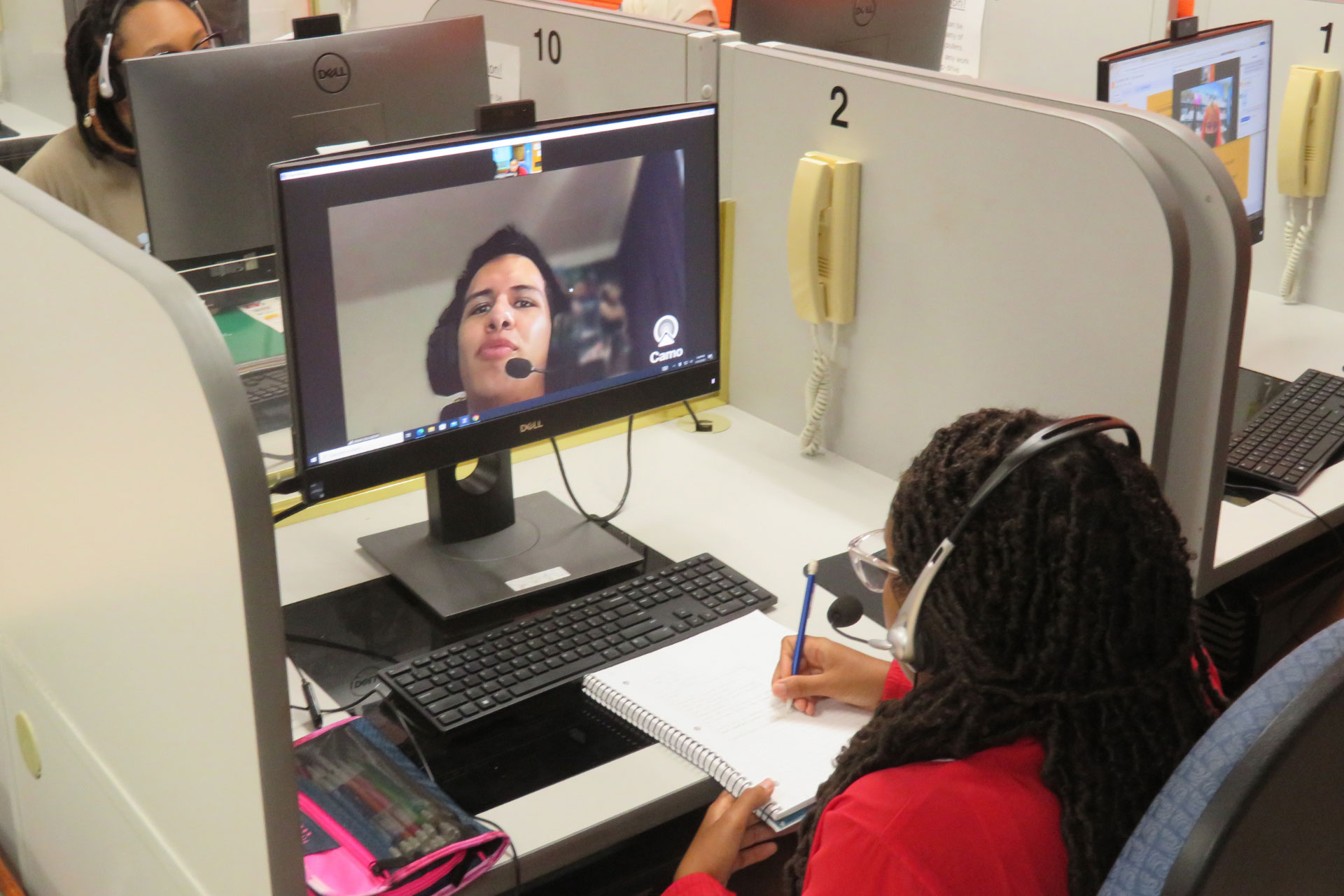World Languages Students at Morgan State Support Asylum Seekers Through Transformative Service-Learning Project
Collaborative Project in Association with the Sheller Center for Social Justice and the Washington Office on Latin America Aids in Critical Spanish Translation Effort
Morgan Students enrolled in the James H. Gilliam, Jr. College of Liberal Arts course SPAN 420: Interpreting and Translating Spanish I recently concluded an immersive translation project transcending both regional and international borders. The collaborative service-learning project paired Morgan students with the Sheller Center for Social Justice students at Temple University’s Beasley School of Law and the Washington Office on Latin America (WOLA), a leading non-profit organization advocating human rights, to support asylum seekers in the United States.
The project involved compiling crucial information on conditions in Latin American countries. Given the linguistic barriers many asylum seekers face, particularly those from Spanish-speaking countries, the students’ primary role was translating documents from Spanish to English.
“My students showed me that working collaboratively on a service endeavor builds a strong sense of community in the classroom,” said Megan DeVirgilis, Ph.D., assistant professor of Spanish within the Department of World Languages and International Studies and program coordinator of Morgan’s Latinx, Latin American and Caribbean Studies Program. “I witnessed them build a cohort that worked through obstacles together and produced meaningful, even lifesaving, resources together. Their sense of collective pride was palpable.”
Students were tasked with translating extensive writings and compilations on Latin American country conditions, spanning youth gang culture and criminal activity, state complicity, internal relocation, gender-based violence, and more. These accounts were largely used to support the cases of those seeking asylum in the United States. According to Dr. DeVirgilis, by semester’s end, advanced Spanish students completed nine Spanish-English translations of Nicaraguan newspaper articles on femicide (the intentional killing of women or girls because of their gender) and feminicide (the intentional killing of women or girls because of their gender understood as part of a larger state, judicial and societal tendency to normalize misogyny).

“The hardest part of the project was reading some of the experiences of what women have to live through on a day-to-day basis and this only encouraged me to research and dig deeper for understanding, especially since my translations are going to serve people who need the help,” said Kiera Gardner, a senior Biology major with a double minor in Chemistry and Spanish.
These translated articles now form an integral part of the Annotated Table of Contents, a comprehensive resource compiled by the Sheller Center and WOLA. This resource is specifically designed to assist asylum seekers’ lawyers in better understanding and advocating for their cases.
Uncertain if the sensitive subject matter could make some students feel uncomfortable engaging with the material and dissuade them from participating, Dr. DeVirgilis had an alternate assignment readily available to accommodate any on-takers. However, the project was met with full participation as the SPAN 420 class was eager to challenge themselves linguistically and emotionally to effectively support women at an international level.
Describing their experience and its impact, Addis Romero, a sophomore majoring in Strategic Communications and minoring in Spanish, shared, “I discovered a heightened interest in global issues and a desire to contribute more actively to causes aligned with social justice. I learned the power of collaboration and the significance of diverse perspectives in approaching complex problems.”
Morgan’s SPAN 420: Interpreting and Translating Spanish I provides students with the theoretical foundation and real-world practice to carry out a broad range of translations. In particular, the course focuses on areas where there is non-equivalence between languages (idioms, grammatical structures that exist in one language but not the other, etc.) and explores strategies to confront this non-equivalence.
By collaborating with organizations such as the Sheller Center and WOLA, Morgan continues to demonstrate its commitment to community engagement, expanding the worldview of its students and addressing pressing social issues.
Gardner added, “I love the fact that I—in my world—am making an impact on others—in theirs—and I am grateful for this opportunity.”
 Earlier this year, the National Endowment for the Humanities (NEH) announced $33.8 million in grants for 260 humanities projects across the country.Morgan’s World Languages and International Studies Assistant Professor, Dr. Megan DeVirgilis, was among the recipients of NEH’s Faculty Awards. These awards were designed to strengthen public humanities programming and support advanced research in the humanities by scholars, teachers, and staff at Historically Black Colleges and Universities, Hispanic-Serving institutions, and Tribal Colleges and Universities.
Earlier this year, the National Endowment for the Humanities (NEH) announced $33.8 million in grants for 260 humanities projects across the country.Morgan’s World Languages and International Studies Assistant Professor, Dr. Megan DeVirgilis, was among the recipients of NEH’s Faculty Awards. These awards were designed to strengthen public humanities programming and support advanced research in the humanities by scholars, teachers, and staff at Historically Black Colleges and Universities, Hispanic-Serving institutions, and Tribal Colleges and Universities.
Dr. DeVirgilis’ grant-funded project, “Gothic Foundations: The Civilizing Project of a Forgotten Nineteenth-Century Novel by Colombia’s First President of African Descent,” examines how Anglo-European gothic tropes are canonized in Latin literature and further perpetuated by a Nineteenth-century Afro-Latino novelist. Aided by the $20,000 grant, the project aims to increase awareness (and presumably scholarship) around this almost-forgotten politician and writer of African descent, a necessary outcome considering the omission of works by Afro-Latin Americans in the nineteenth-century Latin American literary canon. This award marks the second NEH grant awarded to Dr. DeVirgilis in three years.
Contact Information
Office of Public Relations & Strategic Communications
1700 East Cold Spring Lane
McMechen Hall Rm. 635
Baltimore, Maryland 21251
Contact Information
Office of Public Relations & Strategic Communications
1700 East Cold Spring Lane
McMechen Hall Rm. 635
Baltimore, Maryland 21251


